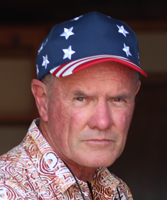
Insightful Musings on the Scriptures
by
Raymond P. Sparre
Northwest University class of '67
Good morning, dear ones.
I had a hard time believing the clock when I finally awoke this morning. It was almost 6:30am. That’s unheard of—like crazy late for me. Now I’m scared. I just had a birthday yesterday—hitting number 71. Is sleeping half the day away evidence of the result?
Last evening I was able to pick up our lawnmower from the mechanic and take on some of our grass jungle. I had to use the GPS function of my smart phone to navigate through the stuff since I couldn’t see over the top of the grass. Just kidding. But I did discover a couple of the dog’s lost balls in the tall grass—nearly chopping them to pieces. I didn’t see any evidence of making snake burger this time—mowing some poor little garter snake out for a walk in the grass. Just a minute—“walk?” Certainly Mr. Snake doesn’t tell Mrs. Snake, “I’m going out for a walk.” Maybe he says, “I’m going out for a slither”—or “Would you like to go for a slither with me?” Sorry. Moving right along—I need to go finish up a mill job and haul the mill home. Hopefully, I can find time to haul my track hoe home too.
Be blessed.
Love, aging Dad/Ray.
Remember who is writing this account of the ship in the storm. It’s Luke. He was a great writer and wonderful loyal companion to Paul. Nevertheless, he was not a seaman and could very well have been one given to sea sickness. This certainly sounds like a situation that would produce that ailment. I know something about sea sickness, too. I think it’s one of the most terrible forms of sickness on the planet insofar as how it makes you feel. I’ve lain on the deck of more than one small ship, not caring about much of anything but ending the misery. I can imagine poor Luke laying down on the deck of that ship, all green and thoroughly miserable, and maybe even wishing that the ship would hurry up and break apart so they could get the ordeal over with. He says, “When neither sun nor stars appeared for many days and the storm continued raging, we finally gave up all hope of being saved.”
I’m reminded once again of that saying, “Man’s extremities are God’s opportunities.” It would appear that God indeed takes this as an opportunity to show Himself mighty to save. Also, He has an indestructible plan in motion that Paul “must stand trial before Caesar” (v. 24). Amidst this horrible crisis the Lord graciously intervenes with a message of encouragement by sending His angel to Paul, assuring him that all would go well, except for the ship.
Paul understood and respected a fact that we all need to understand and respect. He understood that people most generally believe what they want to believe. He knew that everyone must sort out the data of life and determine truth and belief for themselves. He knew that it was impossible to manipulate people into the Kingdom by reasoning or fear or the intensity of presentation. He knew that the Kingdom of God is essentially an invitation that says, “Whosoever will may come.” He knew that he was not the Lord of the harvest, but only a servant responsible to impart the invitation.
Any experienced believer can recall passages of life that were very much like a raging hopeless storm from which there seemed to be no natural escape. Sometimes we reach the end of our strength, endurance, and wisdom to resolve the crisis, giving up all natural hope of being saved. That’s when true faith and hope are tremendously valuable assets.
I like things simple. And I’m thoroughly grateful for the encouragement of God’s Word that makes life for the believer a simple WIN-WIN deal. No matter what you face in this stormy physical world, there are really only two physical options: (1) Either you’re going to live, or (2) you’re going to die. From the Biblical perspective, both options are winners and wonderfully positive. Praise God for the resources of a faith that transcends it all. Paul puts it this way in Philippians 1:21: “For to me, to live is Christ and to die is gain.” I judge that this quality of faith is far more valuable than an American Express card, or a spare tire, or a life insurance policy, or anything.